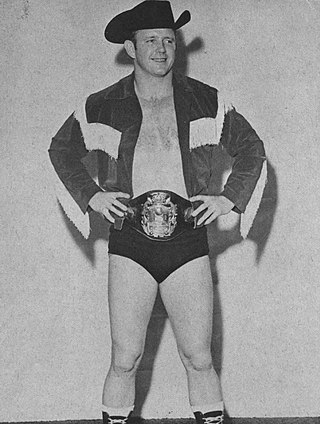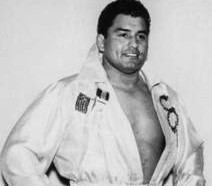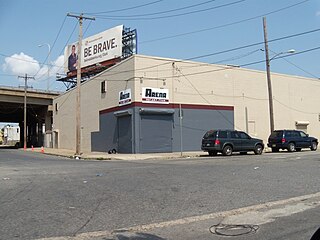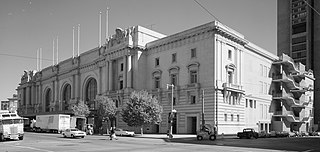Related Research Articles

George Emile Stipich was a Canadian professional wrestler, better known by his ring name, Stan Stasiak. He is best known for his appearances with the World Wide Wrestling Federation (WWWF) in the 1970s, where he won the WWWF Heavyweight Championship in 1973. He was inducted into the WWE Hall of Fame in 2018.

Terrence Funk is an American retired professional wrestler. He is known for the longevity of his career – which spanned more than 50 years and included multiple short-lived retirements – and the influential hardcore wrestling style he pioneered in the latter part of his career. He is considered one of the greatest professional wrestlers of all time.

Dorrance Earnest Funk, known professionally as Dory Funk Jr., is an American retired professional wrestler and wrestling trainer. The son of Dory Funk and brother of Terry Funk, he was the promoter of the Amarillo, Texas-based Western States Sports promotion.

Hoyt Richard Murdoch was an American professional wrestler, better known by his ring names "Dirty" Dick Murdoch and "Captain Redneck". He was best known for his time in the World Wrestling Federation and New Japan Pro-Wrestling.

Dorrance Wilhelm Funk was an American professional wrestler. He is the father of wrestlers Dory Funk Jr. and Terry Funk, and was a promoter of the Amarillo, Texas-based Western States Sports promotion.

Eugene Nicholas Kiniski was a Canadian athlete who played football for the Edmonton Eskimos and then became a three-time professional wrestling world heavyweight champion. "Canada's Greatest Athlete", as he billed himself for promotional purposes, was born in Edmonton, Alberta. Like Bronko Nagurski before him, Kiniski was one of the first world champions in professional wrestling to have a previous background in football. He is the father of professional wrestler Kelly Kiniski and international amateur and professional wrestler Nick Kiniski.

Michael DiBiase was an American professional wrestler, also known by his ring name "Iron" Mike DiBiase. The adoptive father of professional wrestler "The Million Dollar Man" Ted DiBiase, he was married to Ted's mother Helen Hild, and was the grandfather of Mike, Ted Jr., and Brett DiBiase.

Robert Frederick Geigel was an American professional wrestling promoter and professional wrestler. He operated the Kansas City, Missouri-based Heart of America Sports Attractions promotion from 1963 to 1986, and served three terms as the president of the National Wrestling Alliance from 1978 to 1980, 1982 to 1985, and 1986 to 1987.

The National Wrestling Association World Light Heavyweight Championship was a professional wrestling championship originally sanctioned by the National Boxing Association (NBA) and subsequently sanctioned by the National Wrestling Association (NWA), an offshoot of the NBA. The championship had an upper limit of 175 lb (79 kg), anyone above that limit was considered a heavyweight. The championship was created in 1930 and abandoned in the early 1960s.

Kurt and Karl Von Steiger were the ring names of Canadian professional wrestlers Lorne Corlett and Arnold Pastrick. The Von Steiger gimmick was that of two German villains, called heels, despite both wrestlers hailing from Winnipeg, Manitoba. Arnold Pastrick used the name Kurt Von Steiger, and Lorne Corlett worked as Karl Von Steiger. The Von Steigers are best known for competing in Pacific Northwest Wrestling in Portland, Oregon, between 1968 and 1973 but also competed in Tennessee, San Francisco, Stampede Wrestling, Australia, the American Wrestling Alliance and the Carolina territory.

Henry Romero was an American professional wrestler, better known by his ring name, "Rapid" Ricky Romero. Romero was best known for his appearances in Texas during the 1970s.

Leroy Michael McGuirk was an American amateur and professional wrestler, and wrestling promoter. He was involved in professional wrestling for more than fifty years. As one of the longest surviving members of the National Wrestling Alliance (NWA), he was affiliated with the promotion from 1949 to 1982, where he was a one-time NWA World Junior Heavyweight Champion.

Karl Sarpolis was a professional wrestler and wrestling promoter in Texas. He was the promoter of the Amarillo, Texas-based Western States Sports promotion.

Al Lovelock is an American retired professional wrestler best known by the ring name The Great Bolo. Lovelock was active in the 1950s and 1960s and was primarily known for his work in the Carolinas, Georgia, and Florida. Lovelock was the first to use the name "the Great Bolo" but would later allow Tom Renesto to use the name as well.

Danny McShain was an American professional wrestler. He competed in the southern United States from the 1930s to the 1960s.

NWA Hollywood Wrestling was a professional wrestling promotion headquartered in Los Angeles, California in the United States that promoted professional wrestling matches throughout Southern California. It was founded in 1958 as the North American Wrestling Alliance, a member of the National Wrestling Alliance. It broke away from the NWA in 1959 and was renamed Worldwide Wrestling Associates in 1961. In 1968, it rejoined the NWA and adopted its final name, remaining a member until closing in 1982.

The NWA World Title Tournament was a live supercard held by the Philadelphia, Pennsylvania, United States-based professional wrestling promotion NWA Eastern Championship Wrestling (ECW) on August 27, 1994. The event featured a tournament for the vacant NWA World Heavyweight Championship. The commentator for the event was Joey Styles. Highlights from the event aired on the August 29, 1994 episode of ECW Hardcore TV, while the tournament final and the bout between Shane Douglas and 2 Cold Scorpio appeared on the 2012 WWE DVD and Blu-ray release ECW Unreleased: Vol 1; the bout between 911 and Doink the Clown appeared on the 2013 WWE Blu-ray release ECW Unreleased: Vol 2; and the bout between Cactus Jack and Mikey Whipwreck and the Public Enemy was included in the 2005 compilation DVD BloodSport - The Most Violent Matches of ECW.
Ramon Eduardo Rodriguez, better known by the ring name Ciclón Negro, was a professional wrestler who was originally from Venezuela. He toured the Australia, Canada, Japan, Puerto Rico and the United States. He achieved a good amount of popularity and recognition during the 1970s.

NWA San Francisco was a professional wrestling promotion headquartered in San Francisco, California in the United States. Founded in 1935 by "The Utica Panther" Joe Malcewicz (1897–1962), the promotion joined the National Wrestling Alliance in 1949. It traded until 1961, when it folded due to competition from the upstart Big Time Wrestling promotion. The promotion's heartland was San Francisco, with the San Francisco Civic Auditorium as its core venue, but it also ran shows in other Northern Californian cities including Fresno, Oakland, Richmond, Sacramento, San Jose, Santa Rosa, Stockton, and Vallejo.
Fred Kohler Enterprises, Inc. was a company established by businessman Frederick Koch (1903–1969) – known professionally as Fred Kohler – to promote professional wrestling in Chicago, Illinois in the United States.
References
- 1 2 3 4 5 6 "National Wrestling Alliance Western States Sports (NWA Western States)". Cagematch.net. Retrieved November 28, 2017.
- 1 2 3 Tim Hornbaker. "West Texas Wrestling Territory". LegacyOfWrestling.com. Retrieved November 29, 2017.
- 1 2 3 Stafford O. Chenevert (2011). Amber Waves of Grain. Xlibris. p. 15. ISBN 978-1-4628-5526-1.
- 1 2 3 Brian Solomon (2015). Pro Wrestling FAQ: All That's Left to Know About the World's Most Entertaining Spectacle. Backbeat Books. p. 280. ISBN 978-1-61713-627-6.
- 1 2 3 4 5 6 7 Ted DiBiase (2009). Ted DiBiase. Simon & Schuster. p. 106. ISBN 978-1-4165-5920-7.
- 1 2 Harley Race; Gerry Tritz (2004). King of the Ring: The Harley Race Story. Sports Publishing. p. 25. ISBN 978-1-58261-818-0.
- 1 2 Terry Funk; Scott E. Williams (2012). Terry Funk: More Than Just Hardcore. Sports Publishing. p. 93. ISBN 978-1-61321-308-7.
- 1 2 Mike Rickard (2010). Wrestling's Greatest Moments. ECW Press. p. 52. ISBN 978-1-55490-331-3.
- ↑ Tim Hornbaker. "Amarillo Booking Office". LegacyOfWrestling.com. Retrieved November 29, 2017.
- 1 2 3 4 Tim Hornbaker (2007). National Wrestling Alliance: The Untold Story of the Monopoly That Strangled Professional Wrestling. ECW Press. pp. 335–336. ISBN 978-1-55490-274-3.
- 1 2 Terry Funk; Scott E. Williams (2012). Terry Funk: More Than Just Hardcore. Sports Publishing. pp. 27–28. ISBN 978-1-61321-308-7.
- ↑ Terry Funk; Scott E. Williams (2012). Terry Funk: More Than Just Hardcore. Sports Publishing. p. 43. ISBN 978-1-61321-308-7.
- ↑ Kristian Pope (2005). Tuff Stuff Professional Wrestling Field Guide: Legend and Lore. Krause Publications. p. 159. ISBN 1-4402-2810-8.
- 1 2 3 4 Bob Backlund; Robert H. Miller (2015). Backlund: From All-American Boy to Professional Wrestling's World Champion. Sports Publishing. p. 99. ISBN 978-1-61321-696-5.
- ↑ Steven Johnson; Greg Oliver; Mike Mooneyham; J. J. Dillon (2013). The Pro Wrestling Hall of Fame: Heroes and Icons. ECW Press. p. 177. ISBN 978-1-77090-269-5.
- ↑ Brian Solomon (2015). Pro Wrestling FAQ: All That's Left to Know About the World's Most Entertaining Spectacle. Backbeat Books. p. 93. ISBN 978-1-61713-627-6.
- ↑ Danny Andrews (2014). Things I Have Saw and Did: 50 Years of Thinking Out Loud. Xlibris. p. 275. ISBN 978-1-4990-7386-7.
- ↑ Terry Funk; Scott E. Williams (2012). Terry Funk: More Than Just Hardcore. Sports Publishing. p. 49. ISBN 978-1-61321-308-7.
- ↑ Ashley Parrish. "Regional Territories: Amarillo". KayfabeMemories.com. Retrieved November 29, 2017.
- ↑ "NWA Texas Brass Knuckles Title [W. Texas]". Wrestling-Titles.com. 2016. Retrieved November 30, 2017.
- ↑ "NWA International Heavyweight Title [W. Texas]". Wrestling-Titles.com. 2016. Retrieved November 30, 2017.
- ↑ "International Tag Team Title [W. Texas]". Wrestling-Titles.com. 2017. Retrieved December 1, 2017.
- ↑ "NWA North American Heavyweight Title [W. Texas]". Wrestling-Titles.com. 2016. Retrieved November 29, 2017.
- ↑ "NWA North American Tag Team Title [W. Texas]". Wrestling-Titles.com. 2016. Retrieved November 29, 2017.
- ↑ "Southwest States Junior Heavyweight Title [W. Texas]". Wrestling-Titles.com. 2016. Retrieved November 30, 2017.
- ↑ "NWA Southwest States Heavyweight Title [W. Texas]". Wrestling-Titles.com. 2016. Retrieved November 30, 2017.
- ↑ "NWA Southwest States Tag Team Title [W. Texas]". Wrestling-Titles.com. 2016. Retrieved November 30, 2017.
- ↑ "Television Title [W. Texas]". Wrestling-Titles.com. 2016. Retrieved December 1, 2017.
- ↑ "NWA Texas Tag Team Title [W. Texas]". Wrestling-Titles.com. 2016. Retrieved November 30, 2017.
- ↑ "NWA Western States Heavyweight Title". Wrestling-Titles.com. 2016. Retrieved November 28, 2017.
- ↑ Bob Backlund; Robert H. Miller (2015). Backlund: From All-American Boy to Professional Wrestling's World Champion. Sports Publishing. p. 95. ISBN 978-1-61321-696-5.
- ↑ "NWA Western States Tag Team Title". Wrestling-Titles.com. 2015. Retrieved November 28, 2017.
- ↑ "World Tag Team Title [W. Texas]". Wrestling-Titles.com. 2016. Retrieved December 1, 2017.
- ↑ "World Heavyweight Title [W. Texas]". Wrestling-Titles.com. 2015. Retrieved November 30, 2017.
- 1 2 Greg Oliver; Steven Johnson (2010). The Pro Wrestling Hall of Fame: The Heels. ECW Press. p. 164. ISBN 978-1-55490-284-2.
- ↑ John Grasso (2014). Historical Dictionary of Wrestling. Scarecrow Press. p. 80. ISBN 978-0-8108-7926-3.
- 1 2 3 4 James T. Honea (2011). Trouble Times Two. Trafford Publishing. p. 52. ISBN 978-1-4269-6243-1.
- 1 2 Bertrand Hébert; Pat Laprade (2005). Mad Dog: The Maurice Vachon Story. ECW Press. p. 88. ISBN 978-1-77305-065-2.
- ↑ Jake Shannon (2011). Say Uncle!: Catch-As-Catch Can Wrestling and the Roots of Ultimate Fighting, Pro Wrestling & Modern Grappling. ECW Press. p. 102. ISBN 978-1-55022-961-5.
- ↑ Thom Loverro (2007). The Rise & Fall of ECW: Extreme Championship Wrestling. Simon & Schuster. p. 25. ISBN 978-1-4165-6156-9.
- ↑ Brian Solomon (2010). WWE Legends. Simon & Schuster. p. 134. ISBN 978-1-4516-0450-4.
- ↑ Jim Wilson; Weldon T. Johnson (2003). Chokehold: Pro Wrestling's Real Mayhem Outside the Ring. Xlibris. p. 142. ISBN 978-1-4628-1172-4.
- ↑ Dusty Rhodes; Howard Brody (2012). Dusty: Reflections of Wrestling's American Dream. Sports Publishing. p. 47. ISBN 978-1-61321-244-8.
- ↑ Tim Hornbaker (2017). Legends of Pro Wrestling: 150 Years of Headlocks, Body Slams, and Piledrivers. Skyhorse Publishing. p. 699. ISBN 978-1-61321-875-4.
- ↑ Jon Beilue (July 20, 2016). "Beilue: A wrestling life Stamped on his face". Amarillo Globe-News . Retrieved December 1, 2017.
- ↑ Bill Watts; Scott Williams (2006). The Cowboy and the Cross: The Bill Watts Story: Rebellion, Wrestling and Redemption. ECW Press. p. 50. ISBN 978-1-55022-708-6.